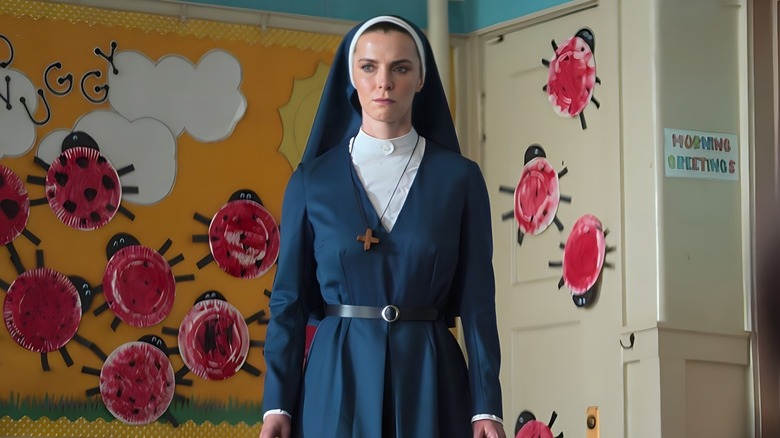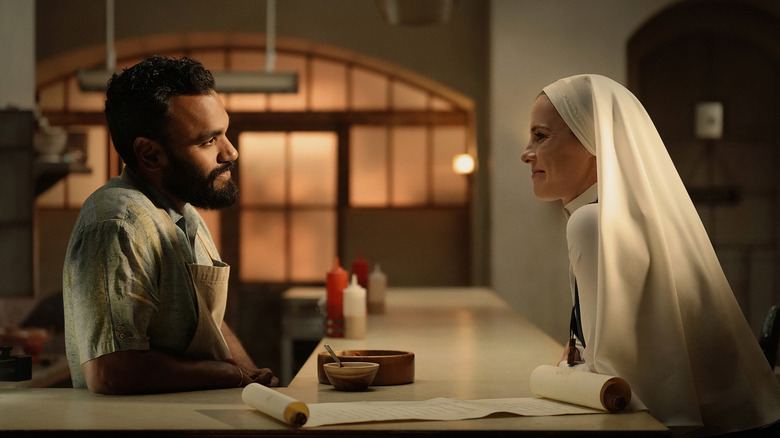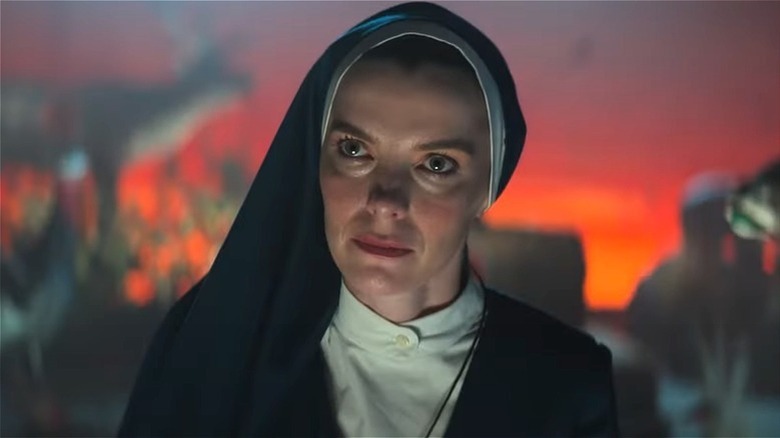Mrs. Davis Signals The Return Of Nunsploitation (But In A Thoughtful Way)
While he isn't averse to penning the odd mindless blockbuster, Damon Lindelof is, for the most part, a thought-provoking artist. From "Lost" to "The Leftovers," his work tends to use supernatural and fantastical storylines to explore existential themes and ideas that have some basis in reality. Now, with "Mrs. Davis," Lindelof and Tara Hernandez have created a story about faith and artificial intelligence that channels elements of the disreputable genre known as Nunsploitation.
Nunsploitation can be traced back to the 1960s, but the subgenre reached its apex in the 1970s when society was more conservative and filmmakers wanted to rage against the machine. While it exists to this day, movies and shows of this ilk are few and far between. The subgenre is known for being offensive and pushing religious buttons, and "Mrs. Davis" isn't exactly a wholesome series about Christianity. It's about an algorithm that recruits a nun named Simone (Betty Gilpin) to track down the Holy Grail, which leads to some pretty wild situations unfolding along the way.
It's possible that "Mrs. Davis" will offend some members of the nun community, as is always the case with Nunsploitation. That said, Lindelof and Hernandez's series is more nuanced than some of the other movies and TV shows that fall into this genre, and it's undoubtedly going to be one of 2023's most discussed series when it's all said and done.
Mrs. Davis isn't the most offensive slice of Nunsploitation out there
Back in the day, some Nunsploitation flicks incited moral panics and got banned in several countries as a result of their anti-religious sensibilities and disturbing content. "The Devils," which was released in 1971, is regarded as one of the most controversial films ever made, and it's still being censored to this day. Generally speaking, Nunsploitation offerings are violent, sexual, and intellectually provocative — and they always feature nuns at the heart of their stories.
"Mrs. Davis" honors the legacy of Nunsploitation in a couple of interesting ways. This is evident from the opening scenes, which entail a group of nuns massacring their enemies. Nuns committing violence is a huge component of this subgenre. Additionally, Simone is in a romantic relationship with Jesus Christ (Andy McQueen) himself, and some viewers might interpret the storyline as being sacrilegious. Nunsploitation has always explored the relationship between sexuality and religious figures, but "Mrs. Davis" takes it further by bringing God's son into the mix.
Furthermore, the series is very critical of religion at times across the board, raising questions such as: why can't a woman be Pope? That said, "Mrs. Davis" isn't an anti-religious show by any means, which is rare for Nunsploitation.
Mrs. Davis is a nuanced examination of faith
Faith and technology are at the heart of "Mrs. Davis," but the show isn't overly critical of either concept. There are good and bad things about both. Granted, the series argues that unchecked technological growth is a dangerous concept and pokes fun at religious institutions. However, the show isn't out to incite any moral panics or make people feel bad about believing in a higher power.
Simone isn't portrayed as a pure-hearted nun in the traditional sense, but she's literally married to Jesus and is also resistant to the algorithm. The rest of the world might be in love with the A.I., but Simone isn't willing to get caught up in the hysteria; her faith has conditioned her to believe in something bigger. She grapples with her belief in God, sure, but her intrinsic faith is what makes her oppose the all-encompassing algorithm.
"Mrs. Davis" is fascinated by faith and how it inspires people to trust in something bigger than themselves; sometimes for good, other times for bad. In some ways, the show is an extension of the ideas that Lindelof explored in "The Leftovers," which looks at belief systems and how they help people process reality. "Mrs. Davis" doesn't want to lambast religion like the Nunsploitation classics of yesteryear, nor is it in favor of Christianity — but that's what makes it such an interesting series to contemplate.


